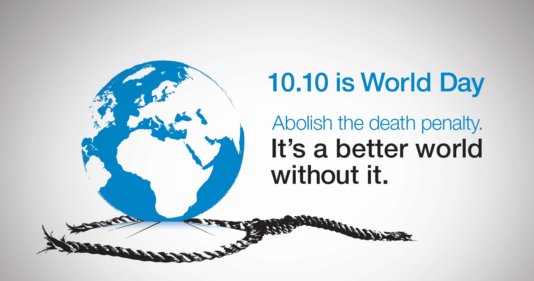- About
- Topics
- Story
- In-Depth
- Picks
- Opinion
- News
- Donate
- Signup for our newsletterOur Editors' Best Picks.Send
Read, Debate: Engage.
| October 10, 2012 | |
|---|---|
| tags: | #abolitionist, #Amnesty, #China, #death penalty, #death row, #Iran, #Iraq, #USA, #world coalition, #world day |
| located: | China, Iran, Iraq, Kazakhstan, USA |
| by: | FairPlanet Editorial Team |
According to Amnesty International, 21 countries recorded executions in 2011, compared to 31 countries 10 years ago. Even the USA, one of the worst offenders in the use of the death penalty, has shown progress as individual states have abolished or limited the death penalty. Many other countries have also abolished the death penalty in the past decade, including: Albania, Argentina, Armenia, Bhutan, Burundi, Cook Islands, Gabon, Greece, Kyrgyzstan, Latvia, Mexico, the Philippines, Rwanda, Samoa, Senegal, Togo, Turkey and Uzbekistan.
Several countries that have not legally abolished the death penalty have at least ended it in practice, either by declaring an official moratorium or by not carrying out executions. For example, Sierra Leone and Nigeria have declared a moratorium on executions, and Tajikistan has had a moratorium on both death sentences and executions since 2004.
Many countries that have not yet abolished or imposed a moratorium have taken steps to narrow the scope of the death penalty. Kazakhstan has abolished the death penalty for ordinary crimes. China recently eliminated the death penalty for certain economic crimes, and it has reintroduced mandatory review of all death penalty cases by the Supreme People’s Court.
Over the last decade, several retentionist countries have implemented many of the universal international safeguards on their application of the death penalty and have eliminated that punishment for certain categories of persons. For example:
Some countries have expanded, or attempted to expand, the scope of the death penalty over the last decade to include:
Certain countries have resumed their use of the death penalty. Afghanistan, Taiwan, Equatorial Guinea, the United Arab Emirates and Japan have resumed executions after a hiatus, in stark contrast with the global trend of abolition. Finally, countries such as China and Iran continue to carry out their executions in secrecy, contrary to fundamental notions that such information should be made available to the public. Moreover, transparency is critical to prevent errors or abuses and safeguard fairness.
On a global scale, further work needs to be done to build on the foundation of abolition thus far by focusing on the following goals:
This text was first published on World Coalition
Video: Amnesty Internetational
By copying the embed code below, you agree to adhere to our republishing guidelines.

